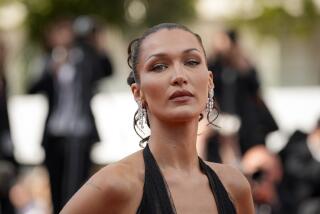Can Ads Help Cure Social Ills?
- Share via
Spike Lee sensed that the message he wanted to convey--racial harmony--was getting lost in the sales hype of Nike’s newest TV commercial.
So, after the commercial was filmed, Lee--who not only starred in the new spot, but also directed it--decided to kill a scene in which he holds up a Nike shoe. “It didn’t fit in the ad,” Lee said of the scene in the ad that features him as peacemaker between two racially divided basketball teams. “This spot has nothing to do with selling sneakers.”
Maybe not. However, a small but growing contingent of apparel companies like Nike, Benetton, Converse and Esprit--who mostly market to younger people--are directly addressing the issue of race relations in product advertisements.
So, too, are some smaller apparel firms that appeal to ethnically diverse audiences, including Cross Colours of Los Angeles, whose ad slogan is, “Clothing Without Prejudice.” All of the advertisers are basically saying the same thing: People of all races can get along. But consumer advocacy groups contend that companies are not saying these things because they actually care, but because it might help sell products--and improve corporate image.
Although Nike’s newest spot premiered Saturday during the NBA basketball playoffs, it was filmed in Los Angeles just two weeks before the verdicts in the beating ofRodney G. King set off days of rioting.
The aftermath of the riots is expected to get a number of advertisers to directly address social issues such as race relations in future campaigns. Some skeptics question whether many of these advertisers--regardless of their intentions--are doing the right thing.
“If they really wanted to promote racial harmony, they’d take their ad money and finance projects in urban areas,” said Michael Jacobson, co-founder of Washington-based Center for the Study of Commercialism. “Any time you have a company like Nike sponsoring an ad, the basic message is selling shoes.”
But for marketing purposes, these advertisers may be right on the mark.
“If you can associate your product with something that your target customers want to associate with, you stand a good chance of winning them over to your brand,” said Barry Glassner, an advertising expert and chairman of the department of sociology at USC. “Clearly, young people today want to be part of helping to improve relations between various cultural groups.”
And buying products from companies whose advertising espouses racial harmony can make some young consumers feel like they’re actually helping--even though they’re not. But one marketing expert warns that the theme could backfire.
“When consumers see company names on an ads like that, they are immediately wary,” said Michael Ray, marketing professor at Stanford University.
Until now, most ads with racial themes have been limited to print ads for apparel makers. But Nike’s latest effort is a TV spot, filmed in a parking lot between 6th Street and Wilshire Boulevard. The ad and features Lee acting as a calming influence between bickering black and white basketball teams. “If we’re gonna live together, we gotta play together,” he says in the ad.
Lee is concerned about other advertisers jumping onto the racial harmony bandwagon--much as they did with the environmental movement--but not living up to their own messages. “If others do it, I can only hope they have the right intent,” Lee said.
But officials at the Center for the Study of Commercialism contend that it is a sham for Nike to advertise itself as being racially sensitive.
“Nike has actually exacerbated inner city problems by promoting a life style perception that many people can’t afford,” Jacobson said. “Kids end up killing each other to get the status that Nike is marketing.”
Nike executives reject that criticism. What’s more, they say, at least their ads are trying to address the problem. “Is is better not to do it at all?” posed Scott Bedbury, Nike’s director of advertising. “Are we supposed to turn our backs completely on racial issues?”
One of the first corporate advertisers to consistently address the issue is the Italian women’s apparel maker, Benetton, which began linking itself with the concept of racial harmony nearly a decade ago. The firm’s print ads often show groups of smiling models from all races. One of its more provocative ads--showing a black woman nursing a white child--generated intense media coverage.
“People can be cynical and say, ‘Oh, that’s just Benetton doing its one-world lovefest thing,’ ” said spokesman Peter Fressola. “But we’ve found a way to create a desire for our products that’s much more subtle and caring than showing an attractive model in a sweater.”
Does it work? It doesn’t hurt. Benetton sales in 1991 were up nearly 12% over 1990. During the same period, net income jumped nearly 24%.
Last year, San Francisco apparel firm Esprit tackled the topic of racism in its ads. The company sponsored a promotion that asked young people about things they would like to change. Many said they wanted to see blacks and whites get along.
Some of the responses were so striking that Esprit executives decided to run print ads that featured the kids--and their written statements. “We don’t look at it as a marketing ploy,” said Sandra Ranke, who oversaw the campaign. “As a business, it is our role to take on issues like this--and to encourage others to do the same. It’s all about living your values.”
Esprit officials were struck last summer by a response from Candice Williams, a 17-year-old Brooklyn high school student. Esprit developed print ads and posters with her picture--and her words. In her letter, Williams said that she wanted to “end racism and the killing of my people in the streets.” Those identical words appear in the poster--and ad.
One year later, Williams is attending a junior college in Manhattan. The ad has brought her publicity. But she said she’d happily exchange that fame for her year-old wish to come true.
“Those words mean so much to so many people all of a sudden,” she said. “Who would have expected it?”
Briefly
Although the California State Lottery handed its $25-million account to the San Francisco office of J. Walter Thompson, the Los Angeles agency Dailey & Associates says it will sue to keep the account, which it claims to have under contract for two more years . . . The Los Angeles agency Asher/Gould has won the $2-million account of Chula Vista-based Family Bargain Centers . . . Nike is preparing an All-Star game ad featuring basketball great Charles Barkley doing a rap song . . . Benetton plans to sponsor a festival in New York City in the fall and is negotiating with singer Paul Simon to perform . . . Commercials speaking to the “Rebuild L.A.” effort could be on TV by mid-summer, says Dennis Holt of Western International Media, who is overseeing the campaign.
More to Read
The biggest entertainment stories
Get our big stories about Hollywood, film, television, music, arts, culture and more right in your inbox as soon as they publish.
You may occasionally receive promotional content from the Los Angeles Times.










